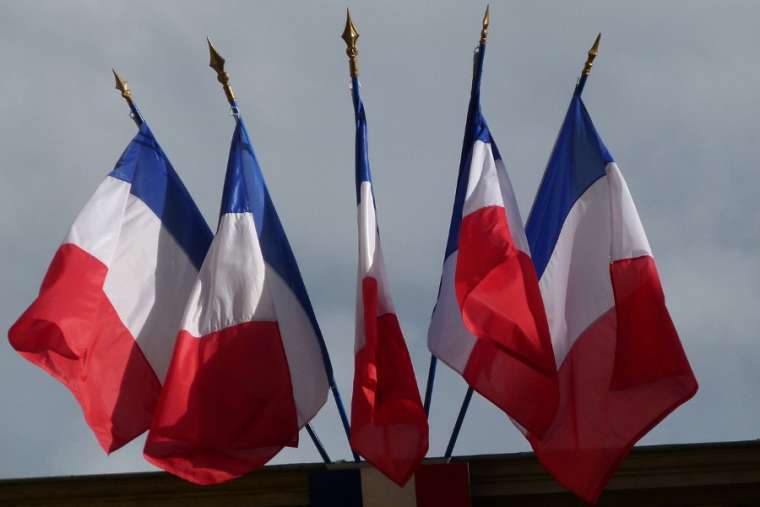French flags. Public domain.
French Catholic bishops signed on Monday a declaration denouncing rising anti-Semitism in the presence of Jewish leaders in Paris.
“Anti-Semitic expression has indeed regained an unexpected vigor,” French bishops’ conference president Archbishop Moulins-Beaufort said before the declaration was signed in Paris on 1 February.
Moulins-Beaufort, the archbishop of Reims, underscored that, in response to the rise in anti-Semitism, moral imperatives and vigilance of the laws were needed, but these alone “will not be enough.”
Together with four other French bishops, Moulins-Beaufort signed a declaration stating that the “fight against anti-Semitism must be everyone’s business” and promising to work with all those engaged in this struggle.
“In recent years, we have witnessed a worrying trivialization of violence with the proliferation of words and gestures expressing discrimination and racism,” the declaration said.
“Social networks … are also a space for individual and collective expression that knows no limits, that benefits from anonymity, and which too often leads to the worst excess.”
“In this context, the bishops appeal to be particularly attentive to the worrying resurgence of anti-Semitism in France.”
France has Europe’s largest Jewish population. With more than half a million people, the country’s Jewish community is the third-largest in the world after those of the United States and Israel.
But France’s interior minister said in 2019 that anti-Semitism was “spreading like a poison” within the country after the government confirmed that there had been a sharp increase in anti-Semitic incidents.
President Emmanuel Macron later suggested that anti-Semitism in France was at its highest levels since World War II.
More than 1,700 anti-Semitic hate crimes took place in Europe in 2019, according to data released in November 2020 by the Organization for Security and Cooperation in Europe (OSCE). Incidents included murder, attempted arson, graffiti on synagogues, assaults on persons wearing religious garments, and the desecration of graves.
In December, April Benayoum, the runner-up for Miss France 2021, was the target of anti-Semitic attacks on Twitter.
Bishop Dominique Blanchet of Belfort-Montbéliard, Bishop Olivier Leborgne of Arras, Bishop Didier Berthet of Saint-Dié, and Bishop Thibault Verny, an auxiliary bishop of Paris, signed the declaration entitled “The fight together against anti-Semitism and anti-Judaism will be the touchstone of all real fraternity.”
In the declaration, the bishops called on all French citizens to “fight energetically against all forms of political and religions anti-Semitism.”
Rabbi Haïm Korsia, the Chief Rabbi of France, welcomed the declaration as a “prophetic initiative,” and Joël Mergui, president of the Israelite Central Consistory of France, said that he read the document with “great emotion,” according to local media.
The bishops declared: “If faith in Jesus distinguishes us and separates us, it also obliges us, in the memory of the terribly dark hours of history and in keeping in mind the victims of the Holocaust and the anti-Semitic assassinations of the last decades, to recognize this: healing from anti-Semitism and anti-Judaism is the essential foundation of true brotherhood on a universal scale.”
“This healing is a demanding path in which all humans must help each other. It begins with ‘spiritual resistance to anti-Semitism.’”
In the declaration, the Catholic bishops also emphasized Christianity’s “unique spiritual connection with Judaism.”
“More than ever, we must remember the importance of the Jewish roots of Christianity. We cannot consider Judaism simply as another religion: Jews are our ‘elder brothers’ (St. John Paul II), our ‘fathers in the faith’ (Benedict XVI),” the text said.
The bishops also cited Pope Francis’ call for fraternity and underlined their commitment to living in “an authentic fraternity” with the Jewish people. They referenced the attack against Christians at the Nice basilica, as well as the murder of Samuel Paty, a French teacher who was beheaded by an Islamist terrorist.
“Our country is a divided, fractured country. Some feel that they are deprived of their destiny. The temptation to look for a cause is great. To appoint a scapegoat is a great temptation,” Archbishop Moulins-Beaufort said.
“We regret to reach so few young people today, but we hope to help them to be artisans of the fraternity for their generations.”
Source: CNA

